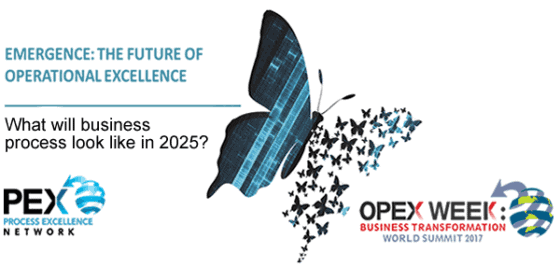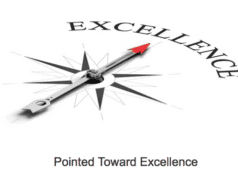Mark's Note: Today's guest post is brought to you through a media partnership between LeanBlog.org and PEX Network. Lean Blog readers can get a 15% discount by using code “VIP_LeanBlog” to for their OPEX Week event in Orlando, January 23 to 27, 2017. I'll be there. Hope to see you.
By Andrea Charles, Senior Editor, PEX Network
It is safe to say that 2016 has been a year of immense and unexpected change. As the global political, economic and regulatory environment shift, the way we do business in the future will fundamentally change. The rule book is being torn up and disruptive technologies are shaking to the very core how organizations operate.
In the face of unprecedented change, I am reminded of a quote I read in my friend and colleague Diana Davis' paper, Emergence: the Future of Operational Excellence:
“The average lifespan of an S&P 500 firm is 18 years today down from 61 years in 1958. By 2027, new firms will replace 75 percent of the companies that were in the Index in 2011″.
Source: Innosight Consulting Research.
It is too early to tell who will be the winners in 2025, so I reached out the PEX Network Global Advisory Board to find out what they thought process excellence would look like in 2025. Here is what two of our key advisors had to say:
“Process Excellence has to do with strategy and the tactics used in its application. However, there can be no single correct strategy of excellence because there are too many variables which are different in each situation and organizational environment including resources, mission, and society.
What can be done is to develop and implement basic principles which will result in process excellence in widely varying circumstances. Therefore, to the extent that organizations focus on improvements in their ability to develop and implement ways to better serve their constituents within their environments, process excellence will improve on into the future.”
– William A. Cohen, PhD, Major General, USAF, Ret. & President, The Institute of Leader Arts
And…
“It will be entirely different than today. Surviving companies will have adopted an ongoing Enterprise Transformation philosophy that is led by a Digital Transformation strategy that is defined within the context of business strategy. This will set the design requirements for a modernization of IT and result in a new IT infrastructure architecture and portfolio.
Applications will be divided into three groups – core applications (HR, Finance, Legal, etc., that must be in place but offer no advantage) will form the first group. These will never provide a competitive advantage and can be supported on licensed software.
The second group will be custom built backroom applications. BPMS generated applications created by a collaboration between the business and IT will replace current legacy applications in this group. These applications actually are the workhorses of the company.
The third and final group are the applications that provide competitive advantage, which will be created by BPM/BPMS staff located in the business units.
The second and third groups of applications will be generated by people in the business areas using low code (by then probably “no code”) BPMS tool suites. These business process specialists will bridge the business/IT gap and redesign the business in the BPMS environment and then generate the solutions. The OPEX people located in the business areas will work closely in an open collaboration model with IT data, hardware, tool, communication specialists and others. This will produce a process excellence capability that is nimble, responsive, collaborative and both low risk and low cost.”
– Dan Morris, Managing Principal, Wendan Consulting

What will the future hold? What are the demographic and economic trends that will shape markets and businesses tomorrow? Which technologies will drive fundamental changes to our ways of working, living and developing as individuals and employees? More importantly for PEX Network‘s community, what will the impact of these big picture changes be on approaches to Operational Excellence and the profession itself.
Find out how leading practitioners and businesses are positioning themselves for success in PEX Network's exclusive report “Emergence: The Future of Operational Excellence.”
Download the report now to find out:
- How the rise of the Millennial Generation is reshaping the customer experience and driving the need for simpler, faster processes
- Why operational excellence programs need to get more strategic and how you can make the shift
- The ways that new technologies – Robotics, Low Code, Artificial Intelligence, Data Analytics, and Process Automation – are causing fundamental change to business processes and how you can start to effectively capitalize on them to promote operational excellence
- The skills and capabilities you need to develop now and in the future to better support your business to achieve true process and operational excellence
To find out more, download PEX Network Annual Report 2016 – Emergence: The Future of Operational Excellence.
Disclosure: Mark Graban is receiving a free media pass to the event, as part of this cross-promotional partnership.
What do you think? Please scroll down (or click) to post a comment. Or please share the post with your thoughts on LinkedIn – and follow me or connect with me there.
Did you like this post? Make sure you don't miss a post or podcast — Subscribe to get notified about posts via email daily or weekly.
Check out my latest book, The Mistakes That Make Us: Cultivating a Culture of Learning and Innovation:










